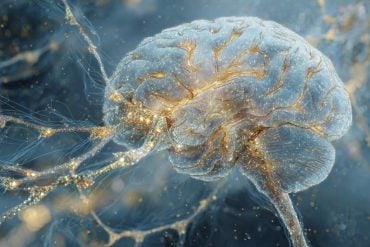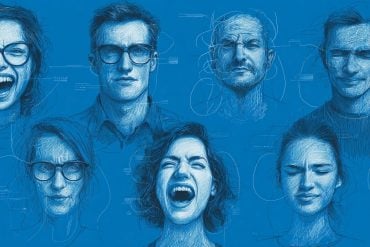Summary: A new study reports older people are less likely to recognize they have made errors than younger people.
Source: University of Iowa.
The older you get, the less apt you may be to recognize that you’ve made an error.
In a new study, University of Iowa researchers devised a simple, computerized test to gauge how readily young adults and older adults realize when they’ve made a mistake.
Older adults performed just as well as younger adults in tests involving looking away from an object appearing on the screen. But younger adults acknowledged more often than older adults when they failed to look away from the object. And, older adults were more likely to be adamant that they did not made a mistake.
“The good news is older adults perform the tasks we assigned them just as well as younger adults, albeit more slowly,” says Jan Wessel, assistant professor in the UI Department of Psychological and Brain Sciences and the study’s corresponding author. “But we find there is this impaired ability in older adults to recognize an error when they’ve made one.”
The research offers new insight how older people perceive their decisions, and especially how they view their performance–whether judging their own ability to drive or how regularly they believe they’ve taken medications.
“Realizing fewer errors can have more severe consequences,” Wessel says, “because you can’t remedy an error that you don’t realize you’ve committed.”
Wessel’s team recruited 38 younger adults (average age of 22) and 39 older adults (average age of 68) to take a series of tests that involved looking away from a circle appearing in a box on one side of a computer screen. While the test was simple, younger adults couldn’t resist glancing at the circle before shifting their gaze about 20 percent of the time on average. That’s expected, Wessel says, as it’s human nature to focus on something new or unexpected, and the researchers wanted the participants to err.
After each failed instance, the participants were asked whether they had made an error. They then were asked “how sure” and used a sliding scale from “unsure” to “very sure” to determine how confident they were about whether they had made a mistake in the test.
The younger participants were correct in acknowledging when they had erred 75 percent of the time. The older test-takers were correct 63 percent of the time when asked whether they had erred. That means in more than one-third of instances, the older participants didn’t realize they had made a mistake.
Even more, the younger participants who made an error on the test were far less certain than the older participants that they were correct. In other words, the younger adults hedged more.
“It shows when the younger adults thought they were correct, but in fact had made an error, they still had some inkling that they might have erred,” says Wessel, who is affiliated with the Department of Neurology and the Iowa Neuroscience Institute. “The older adults often have no idea at all that they were wrong.”
The researchers underscored these observations by measuring how much participants’ pupils dilated as they took the tests. In humans and most animals, pupils dilate when something unexpected occurs–triggered by surprise, fright, and other core emotions. It also happens when people think they’ve blundered, which is why researchers measured pupils in the experiments.

Researchers found younger adults’ pupils dilated when they thought they erred. This effect was reduced when they committed errors they did not recognize. In comparison, older adults showed a strong reduction of this pupil dilation after errors that they recognized and showed no dilation at all when they committed an error they did not recognize.
“That mirrors what we see in the behavioral observations,” Wessel says, “that more often they don’t know when they’ve made an error.”
Contributing authors at the UI include Andrew Hollingworth, professor in the Department of Psychological and Brain Sciences, and Kylie Dolan, an undergraduate psychology major.
Funding: The Aging Mind and Brain Initiative at the UI and the Roy J. Carver Foundation funded the research. Dolan received support from the UI’s Iowa Center for Research by Undergraduates.
Source: Richard Lewis – University of Iowa
Publisher: Organized by NeuroscienceNews.com.
Image Source: NeuroscienceNews.com image is in the public domain.
Original Research: Abstract for “A blunted phasic autonomic response to errors indexes age-related deficits in error awarenessg” by Jan R. Wessel, Kylie A. Dolan, and Andrew Hollingworth in Neurobiology of Aging. Published August 2018.
doi:10.1016/j.neurobiolaging.2018.06.019
[cbtabs][cbtab title=”MLA”]University of Iowa”Older People Less Apt to Recognize They’ve Made a Mistake.” NeuroscienceNews. NeuroscienceNews, 3 August 2018.
<https://neurosciencenews.com/older-people-mistakes-9652/>.[/cbtab][cbtab title=”APA”]University of Iowa(2018, August 3). Older People Less Apt to Recognize They’ve Made a Mistake. NeuroscienceNews. Retrieved August 3, 2018 from https://neurosciencenews.com/older-people-mistakes-9652/[/cbtab][cbtab title=”Chicago”]University of Iowa”Older People Less Apt to Recognize They’ve Made a Mistake.” https://neurosciencenews.com/older-people-mistakes-9652/ (accessed August 3, 2018).[/cbtab][/cbtabs]
Abstract
A blunted phasic autonomic response to errors indexes age-related deficits in error awareness
Conscious error detection is impaired in older age, yet it is unclear which age-related changes in the nervous system contribute to this deficit. In younger adults, error commission is accompanied by phasic autonomic arousal, which purportedly contributes to conscious error detection. Because aging is associated with declining autonomic reactivity, reduced phasic arousal to errors may therefore contribute to age-related error detection deficits. To test this, we measured pupil dilation in younger (<30 years) and older (60–80 years) healthy adults during an eye movement task. The task required a subjective assessment of response accuracy, as well as a “meta-judgment” of the certainty underlying that accuracy-assessment. This allowed for a precise quantification of subjective error awareness. Behaviorally, we found reduced error awareness in older adults. Furthermore, while younger adults showed “residual” awareness of error commission on unreported errors (indicated by decreased rating certainty compared with correct responses), this effect was absent in older adults. Notably, pupil dilation correlated with both measures: between subjects, greater pupil dilation to reported errors was correlated with greater subjective certainty of error detection, and greater pupil dilation to unreported errors was correlated with greater “residual” awareness of unreported errors. In line with this association, older adults showed a reduced pupil response to both reported and unreported errors. Notably, older adults showed no pupil dilation to unreported errors, in line with their lack of “residual” error awareness on such trials. Taken together, our results suggest that reduced autonomic reactivity may contribute to age-related error awareness deficits.







